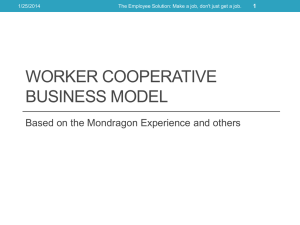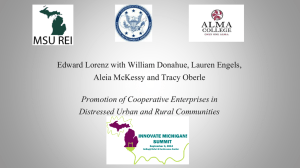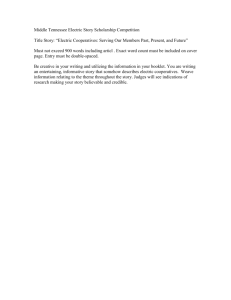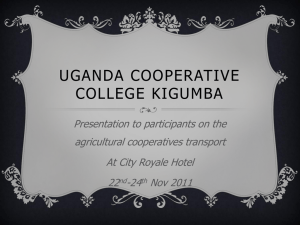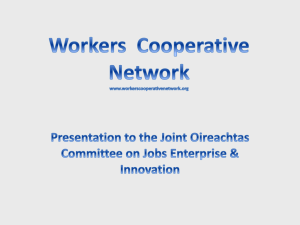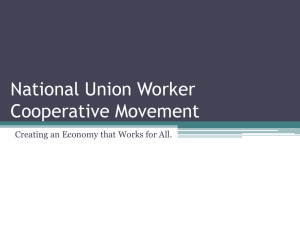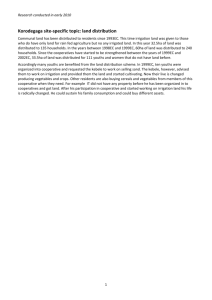Mondragon Corporation Cooperatives, People Working Together Sonia Rolland
advertisement
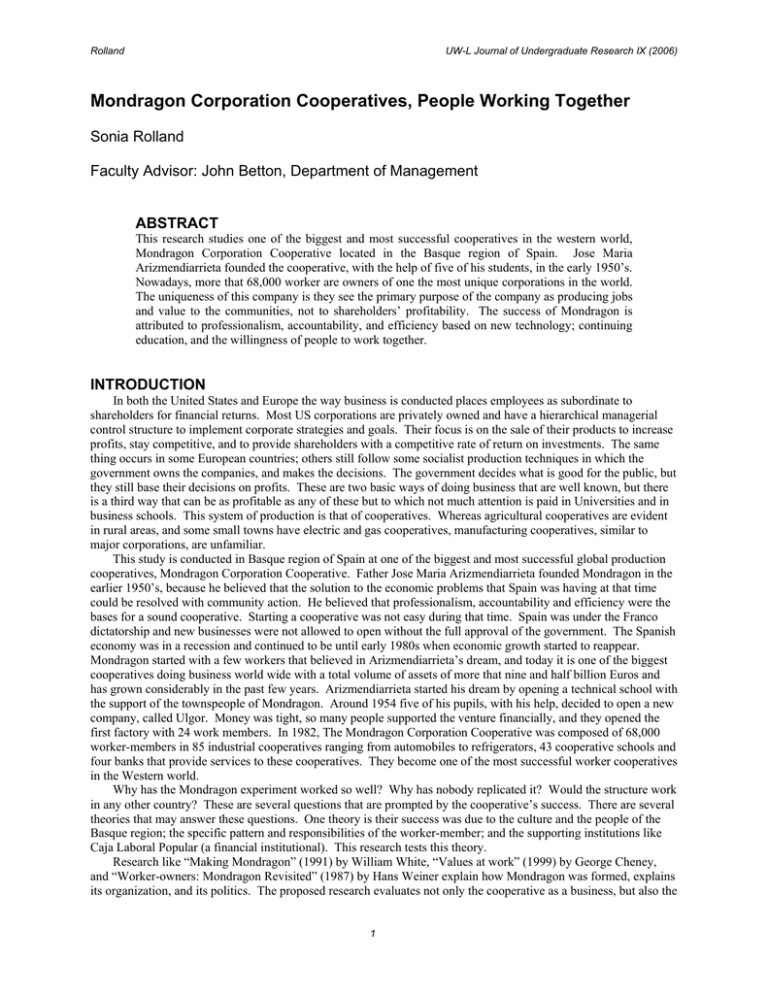
Rolland UW-L Journal of Undergraduate Research IX (2006) Mondragon Corporation Cooperatives, People Working Together Sonia Rolland Faculty Advisor: John Betton, Department of Management ABSTRACT This research studies one of the biggest and most successful cooperatives in the western world, Mondragon Corporation Cooperative located in the Basque region of Spain. Jose Maria Arizmendiarrieta founded the cooperative, with the help of five of his students, in the early 1950’s. Nowadays, more that 68,000 worker are owners of one the most unique corporations in the world. The uniqueness of this company is they see the primary purpose of the company as producing jobs and value to the communities, not to shareholders’ profitability. The success of Mondragon is attributed to professionalism, accountability, and efficiency based on new technology; continuing education, and the willingness of people to work together. INTRODUCTION In both the United States and Europe the way business is conducted places employees as subordinate to shareholders for financial returns. Most US corporations are privately owned and have a hierarchical managerial control structure to implement corporate strategies and goals. Their focus is on the sale of their products to increase profits, stay competitive, and to provide shareholders with a competitive rate of return on investments. The same thing occurs in some European countries; others still follow some socialist production techniques in which the government owns the companies, and makes the decisions. The government decides what is good for the public, but they still base their decisions on profits. These are two basic ways of doing business that are well known, but there is a third way that can be as profitable as any of these but to which not much attention is paid in Universities and in business schools. This system of production is that of cooperatives. Whereas agricultural cooperatives are evident in rural areas, and some small towns have electric and gas cooperatives, manufacturing cooperatives, similar to major corporations, are unfamiliar. This study is conducted in Basque region of Spain at one of the biggest and most successful global production cooperatives, Mondragon Corporation Cooperative. Father Jose Maria Arizmendiarrieta founded Mondragon in the earlier 1950’s, because he believed that the solution to the economic problems that Spain was having at that time could be resolved with community action. He believed that professionalism, accountability and efficiency were the bases for a sound cooperative. Starting a cooperative was not easy during that time. Spain was under the Franco dictatorship and new businesses were not allowed to open without the full approval of the government. The Spanish economy was in a recession and continued to be until early 1980s when economic growth started to reappear. Mondragon started with a few workers that believed in Arizmendiarrieta’s dream, and today it is one of the biggest cooperatives doing business world wide with a total volume of assets of more that nine and half billion Euros and has grown considerably in the past few years. Arizmendiarrieta started his dream by opening a technical school with the support of the townspeople of Mondragon. Around 1954 five of his pupils, with his help, decided to open a new company, called Ulgor. Money was tight, so many people supported the venture financially, and they opened the first factory with 24 work members. In 1982, The Mondragon Corporation Cooperative was composed of 68,000 worker-members in 85 industrial cooperatives ranging from automobiles to refrigerators, 43 cooperative schools and four banks that provide services to these cooperatives. They become one of the most successful worker cooperatives in the Western world. Why has the Mondragon experiment worked so well? Why has nobody replicated it? Would the structure work in any other country? These are several questions that are prompted by the cooperative’s success. There are several theories that may answer these questions. One theory is their success was due to the culture and the people of the Basque region; the specific pattern and responsibilities of the worker-member; and the supporting institutions like Caja Laboral Popular (a financial institutional). This research tests this theory. Research like “Making Mondragon” (1991) by William White, “Values at work” (1999) by George Cheney, and “Worker-owners: Mondragon Revisited” (1987) by Hans Weiner explain how Mondragon was formed, explains its organization, and its politics. The proposed research evaluates not only the cooperative as a business, but also the 1 Rolland UW-L Journal of Undergraduate Research IX (2006) people that work for Mondragon, why they work for the cooperative, and what drives them to be part of the most successful worker-members cooperative business in the world. This study focuses more on the history, structure, education, and efficiency of this coop, from the human perspective, instead of the business perspective. Don Jose Maria Arizmendiarrieta believed that people could turn an economy around; he believed that people can create their own employment if they are given the skills and concepts necessary, and his dream was a success. The surveys given to employees at the Mondragon factories help to understand what drives these people to continue with that dream. Mondragon has been in business for more than forty years, and instead of changing their ways to focus on profits and producing returns to shareholders, they continue doing business as seems fit for them, adapting to new technologies, focusing on education, and most of all focusing on the cooperative member and the community. THE BEGINNINGS OF THE MONDRAGON COOPERATIVES Father Jose Maria Arizmendiarrieta had a dream, he believed in collective solidarity. He believed that generating riches in Society is done through business development and by creating employment, but this is better if done in Cooperatives. This is part of the Mondragon mission statement created by father Don Jose Maria. His dream did not stop there, he believed in giving the people of Mondragon the necessary skills to create a corporation that would not only help to support themselves, but also the community. In order to provide the youth of Mondragon with these skills, he started to teach in the apprentice school of the Union Cerrajera, which was the main factory in Mondragon, in the Spain of the 1950s. Soon after, the school became too small for the teachings of Father Jose Maria, and they opened a new school in Mondragon that taught mostly craft and industrial skills to boys between fourteen and sixteen years of age. This school was the Escuela Politecnica Professional or, in Basque, the Mondragon Eskola Politeknikoa, which became very important for Arizmendiarrieta’s vision of creating the biggest and most successful cooperative in the Pais Vasco. (Lezamiz, 2003; Whyte, 1991) The Mondragon Corporation Cooperative began in the Pais Vasco, a region in the North of Spain near the Pyrenees, in a town that carried its name. Five young students from the Escuela Politecnica, following Arizmendiarrieta’s steps, created the financial basis for what we know today as Mondragon. These five men, whose names are Usatorre, Larrañaga, Gorroñogoitia, Otmaechea, and Ortubay, make the name of the first Cooperative Ulgor, put their savings, and trust in each other together to make a collective investment. This became the first step in creating the empire of Mondragon. However, their limited financial resources were not enough to embark on this adventure. They needed more financial support, to which once again, father Jose Maria came to the rescue. He came out with a strategy to raise funds for the cooperative that involved the whole community, which, after all, was the basis of his philosophy. They used a very popular tradition in Spain to get the community involved in their vision. They chose the Basque tradition of ir de vinos or el chiquiteo, which meant that everyday after work, these five entrepreneurs would go to the bars and cafes, where everyone gathered after a hard day of work. They talked to the villagers, and they spread their idea of creating a company that would focus on not only creating employment and profits, but most importantly would focus on the people of Mondragon. They told bartenders, bosses, and laborers that they were planning to open this new concept of a cooperative in their backyards, and that they needed money in the form of loans, to help start their new adventure. This strategy worked because the people of Mondragon loaned the five entrepreneurs the amount of 11 million pesetas, a huge amount for the Spain of 1959. After raising the funds they opened their first factory called Ulgor, now called Fagor Electrodomesticos, which employed 24 workermembers, and started manufacturing paraffin stoves and heaters. (Gilman, 1983, Whyte, 1991, Corporate, 2004) Father Jose Maria’s dream started to become a reality, but not without many challenges, that he and his five disciples learned to deal with and without ever loosing their mission of creating riches without sacrificing society. (Lezamiz, 2003) MONDRAGON EVOLUTION By the early 1960s, Ulgor has grown at a very steady pace. New firms were created to meet Ulgor’s necessities. These new cooperatives manufactured the component parts that Ulgor used in the assembly of their stoves and heaters. For example, Copreci was funded to manufacture the taps and safety systems for the gas stoves that Ulgor was producing. The new cooperatives acted as their own entities, which meant that they had the same structure, policies and responsibilities as Ulgor. Moreover, they were able to sell to other buyers, as long as Ulgor’s needs were satisfied, which creates more job opportunities for people that are interested in becoming part of a coop. This is how Ulgor become part of Ularco, which represents the three cooperatives of Mondragon: Ulgor, Fagor Arrasate, which manufactured machine tools from Ulgor, and Copreci. (Whyte, 1991, Corporate profile, 2004) 2 Rolland UW-L Journal of Undergraduate Research IX (2006) One of the problems that the five disciples met was the fast growth of the Mondragon Cooperatives. With the creation of more cooperatives, the problem of financing those cooperatives also arrived. How did the Founders of Ulgor manage to solve this problem? Well, as they did with everything else, they founded their own financing cooperative, La Caja Laboral Popular. (Whyte, 1991; Wiener 1987) La Caja Laboral played a very important role in supporting the development of the Mondragon Cooperatives. Without the financial support that La Caja Laboral provided, many coops and laborers would not have survived the obstacles that arose over the years. (Freundlich, 1998; Wiener, 1987). La Caja Laboral was created, not only for financial benefit, but also to channel people’s savings into the cooperatives, for research and development purposes, the creation of other cooperatives, and for the employee’s bank accounts. The Caja Laboral became the backbone of all the coops. With a financial institution of their own, the cooperatives did not have to depend on the government banks to finance their new ventures, the Caja Laboral would take care of them until their venture become a success, even if this meant having a zero interest rate until the cooperative was in a good financial situation . (Whyte, 1991) In 1958, thanks to the “Ministerio de Trabajo” (The Spanish Workers Ministry) all cooperatives were excluded from all social security benefits, which include the health benefit and retirement plan which all Spanish worker has under the Spanish Social Security. This new law was against Father Jose Maria’s philosophies of social welfare. Now Don Jose Maria and the five needed to come up with a solution to the problem of social benefit. They created a new cooperative, named Lagun-Aro. An institution based on the idea of personal responsibility and community sharing. Today Lagun-Aro provides medical insurance, disabilities insurance, life insurance, etc. for all workermembers, giving social protection to its worker-owners. Today Lagun-Aro’s structure is studied by many for many corporations around the world. (White, 1991; Wiener, 1987; Lezamiz, 2005) GOVERNANCE STRUCTURE Today Mondragon is composed of 218 entities, of which 150 cooperatives are located in the Basque Country and 68 participants are located outside of the community. Of these 40 plants are overseas and 28, are Sociedades Anonimas (small corporation, not yet cooperatives) in Spain. (Lezamiz, 2003; Corporate, 2004) All Cooperatives have the same unique basic structure, and are driven by the same policies and responsibilities: General assembly Asamblea General Audit Committee Interventores de cuentas Governing Council Consejo Rector Management Council Consejo de direccion Social Council Consejo Social General Manager Gerente Management Council Consejo de Direccion It is very important to understand that every cooperative has the same structure. It does not matter what the number of member-workers is that own the cooperative, or the type of cooperative that it is. Each department’s functions are explained bellow using the example of Fagor Mini-Domesticos which is composed of approximately 176 worker-members. • All 176 worker-owner compose La Asamblea General, or the general assembly of the Fagor MiniDomesticos Cooperative. The most fundamental function of the assablea general is the right to vote on issues that affect the cooperatives. Better yet, all the members have not only the right but also the obligation to vote owners of the cooperatives. Members meet once a year to discuss issues presented throughout the year. At this time, members 3 Rolland UW-L Journal of Undergraduate Research IX (2006) will approve all the projects, changes, and strategic planning for the next year. Other function of the Asamblea is the ability to appoint and dismiss the members of the Consejo Rector, which are elected by merit from all the assembly members. As time goes by and the cooperatives grow larger and larger, and the number of members increases, it becomes very difficult to maintain a high level of active participation by all the members in the General Assembly. This becomes a problem because it is very time consuming hearing all the issues the issues that members have in their cooperatives at the General assemblies. To solve this problem, the general assembly voted to form a new department the Consejo Social, explained later in this report, in which members of each cooperative choose a few representatives of their coop to form part of the Social Council. These representatives will provide the members with all the information necessary pertinent to the meetings. The members can get together with other member to talk about the main issues and decide to vote to support or reject on that matter, this shortens the time spend in the annual meeting, and still gives the entire assembly the ability to discuss issuea, raise their concerns, and most importantly to vote. (Gorroñogoitia, unknown; White, 1991) Once you become a member of the Mondragon family, you have certain obligations to the rest of the members. One of those obligations is to become an active participant in the general assembly. Here is where all the decisions about the company are made and every one has the right to express their opinion on what it will be best for each employee. Members take this responsibility very seriously because affects their lives and their communities. (Gorronogoitia, Unknown; Lezamiz, 2003) • El Consejo de Intervención de Cuentas, or the Audit committee is an internal committee composed of three members elected every four years. This committee is elected by the general assembly, and makes sure all accounting requirements are done in a correct manner. Their first function starts like any other accounting or financial firm, by reviewing all the revenues and expenses for that year and compare them to the financial reports produced by the cooperative. If anything is found in the financial reports that need to be justified, they will go directly to the person that was responsible for that transactiont and will solve the issue. In addition to the internal audit, they will verify that each department is conducting everything in accordance with the specifications of the Governing Council, and the General Assembly. Also as a requirement of the Government of Spain, the cooperatives are subject to external audits done by big private corporations such as Merrill Lynch. No problems usually appear with the financial reports of these entities, and are available for public viewing upon request, at each cooperative or at their web sites. (Gorroñogoitia, unknown; Lezamiz, 2005) Another important function of this committee is to assure that all the activities done in the general assembly are done according to regulations. For example, this committee makes sure that all the votes are counted correctly after an election is completed. This Committee is a safety net for the General Assembly so all the decision that they make in their annual meetings are followed and completed correctly. Members of the audit comities have very important positions, and only very well respected and trustworthy worker-members are elected to these positions, and many of them are reelected for several terms. This is how much faith and trust member put in each other. (Gorroñogoitia, unknown; Lezamiz, 2005) • El Consejo Rector, or the Governing Council’s members focus on the representation, government, and management of the Members of the Cooperative. As all of the other officials, the General Assembly elects the members of the Governing Council. It is important to understand that these officials do not receive any monetary rewards for the extra duties that they perform; they do it because they are elected by their peers and other members of the coop, and it is a privilege to become part of the Governing Council of the cooperative. The members of the Consejo Rector could be any member of the General Assembly from a blue-collar worker, to a member who has a master’s degree in management. They do not receive any extra income for their time and knowledge. (Gorroñogoitia, unknown; Lezamiz, 2005; White, 1991) The Council is composed of twelve members of whom six members are elected every two years. The duration of their term is four years. As mentioned before, the functions of the Council are representation, government, and management, but these roles can be divided in to the following subcategories: • Social representation, which focuses on all the activities related to the members of the General Assembly. There are three major functions of the Council within this category. First, everything that is related to the rights and obligations of the member, like qualification, information on meetings, and levels of salaries would fall into this category. (Gorroñogoitia, unknown; White, 1991) Second, they are responsible for nominating and dismissing members of the management team, like the general manager and all the administrators of the cooperative, and giving them the specific responsibilities as is necessary or mandated by the General Assembly. (Gorroñogoitia, unknown; White, 1991) 4 Rolland UW-L Journal of Undergraduate Research IX (2006) Thirdly, everything related to Laboral activities, and the discipline of member workers. They have to make sure every member of the cooperative is following the rules described by the Rules and Regulations of the Cooperative system of Mondragon. (Gorroñogoitia, unknown, White, 1991) • The Economic Situation is a very important function of the Governing Council because here is where they create a strategic plan and plan for managing the cooperatives. The General Assembly has to approve these plans each year, but the council studies the economic situation o the coop and it surroundings and tries to come up with specific strategic plan that will beneficiate the company. Within this subcategory, the Council makes decisions on issues that are presented to them by the general manager. Each month they analyze the cooperatives to see if all the objectives elected by the General Assembly are being carried out correctly. At the end of the year, they will present the financial report to the General Assembly. (Gorroñogoitia, unknown; Lezamiz, 2005; White, 1991) • Within the Legislative and Institutional categories fall all other functions that are not mentioned above: from convening the Assembly to analyzing situations that are not very clear, by using the rules and regulations of the cooperatives. The most important function that they perform is to maintain an internal relationship between the social council and the management council, making sure everyone is aware of what is going on in the cooperative, and no loose ends are missed. (Gorroñogoitia, unknown; White, 1991) As the Audit committee, it is very important that the General Assembly elect the right members to form the Governing Council. These members need to have the necessary experience in business, but also it is important that the council is composed of a diversity of members so all the different groups of workers- members interests are taken into consideration. (Gorroñogoitia, unknown; White, 1991) The formation of this council was to create a balance in the decision-making of the cooperative. Because the members are elected from all member workers, this keeps the idea of industrial democracy alive, and everybody believes that people are working for the benefit of the whole cooperative. (Gorroñogoitia, unknown; White, 1991) • El Consejo Social or the Social Council is not mandatory in a cooperative. In Cooperatives of less of 100 members, it is much easier to get together and discuss issues in a very civilized way. When cooperatives grow and the number of members reaches over 100, then most cooperatives create a social council, this is to assure that all members are treated equally. (Gorroñogoitia, unknown; Lezamiz, 2005; White, 1991) The Social Council has four very important functions: • First, it maintains the information flowing between the members of the cooperative and the governing council. All the decisions that are made or are proposed by the governing council are passed to the members by the Social Council. In addition, all issues that are going to be discussed in the annual General Assembly are presented to the members by the social council to facilitate the decision-making and shorten the amount of time to reach a decision. • The second function is Social Control. The social council makes sure that all worker members and all elected officials receive the necessary information to follow the objectives that the general assembly had proposed. • Consulting is the next function, in which members that have more experience in some issues advise other members that have questions on issues that are going to be discussing during the general assembly. • Lastly, the Labor Negotiation functions. The social council acts like an internal union to negotiate all issues related to labor, and then they will be discussed in the annual general assembly. These are the functions that the social council has. It is more for the benefit of the members that that of the cooperative, it reduces time in the meeting and to keep all members informed on the issues that are going to be discussed during the annual general assembly, which give time to the members to think about those issues, do reseach if necessary, be better educated on the issue and vote without being rush. (Gorroñogoitia, unknown; Lezamiz, 2005; Whyte, 1991) • El Consejo de Direccion, or the Management Council are responsible for the basic functions of the cooperatives, like production, sales, and human resources. The president of the Governing Council is also a member of the management council. Although he has a voice in the decision making, he does not have a vote. He is there to make sure that all the objectives and projects are going as planned. Members of the Management Council meet at least once a month to discuss all issues related to the cooperatives and to schedule special meetings to discuss strategic planning that will be proposed to the General assembly in their annual meeting. Most of the time, the General Assembly will approve all proposals given by the Management Council. The Governing Council nominates all of the Management Council’s members, who are business graduates. (Gorroñogoitia, unknown; Lezamiz, 2005; White, 1991) • The General Manager is the member elected by the Governing Council to manage the Cooperative. He is the Chair of the Management Council and makes sure all the objectives proposed are done in an efficient way and according to protocol. The General Manager, as any General Manager of any company, is responsible for informing the rest of the council how the cooperative is performing, controlling all aspects of production, and decisionmaking. All general managers have a lot of influence because they are business professionals that specialize in 5 Rolland UW-L Journal of Undergraduate Research IX (2006) working in cooperatives, and the Governing Councils gives a lot of latitude on decision making to the General Manager. (Gorroñogoitia, unknown; Lezamiz, 2005; Whyte, 1991) REQUIREMENTS TO BECOME PART OF A COOPERATIVE To join a cooperative, each member must contribute an amount specified by the General Assembly. It is around €12,000, and can be paid by the member over a period of thirty months. This amount is the cost of creating a new job, at level one earnings. The fee not only creates capital for the cooperative, but also makes the future member understand the importance of the role that they will be playing if they become permanent members of the Mondragon Cooperatives. (Gilman, 1983; Gorronogoitia, Unknown; Lezamiz, 2005) It is important to understand the social aspect of Mondragon. The idea is not about money, it is about the community. Therefore, to be fair and equal to all the members they have created a particular range of earnings. In general, they have a ratio of 1 to 4.5 between the highest and the lowest income, but today in the Mondragon Cooperatives, the President of Congress, Don Juan Maria Otaegui, earns 9 times more than the lowest earnings, which is the highest earnings in Mondragon. Even so, the lowest earning members earn about €12,000, which is more than the same position outside of Mondragon. On the other hand, the highest earning members earn less than their corporate colleagues. There are many non-monetary rewards, like access to education, free health care, and social security. These fringe benefits are more important for some members that the idea of having a higher paycheck. (Lezamiz, 2005) PROFITS Spanish law provides the regulations on how all the cooperatives must distribute their profits and is as follows: 10% of the profits is utilized for education, 20% for improvements of the cooperative and 70% can be distributed among the members as they wish. The Mondragon Complex does not believe that these percentages will help their communities. They believe that helping the community will have a bigger effect on every owner of the coop that just sharing the profits. Their distribution of the profits is as follows: the first 10% goes for charity, education purposes and the community as the law requires. They allocate 45% for investment and development of the cooperatives, and the last 45% is distributed to the members, but the money is capitalized in an account that the cooperative keeps for each member at the Caja Laboral Popular. This money is loaned by the Caja Laboral to the cooperatives to improve their factories, creation of other cooperatives or anything that the General Assembly deems necessary. In return, the Caja Popular gives 7.5% interest on these accounts and the interest can be withdrawn once or twice a year depending of the cooperative. The rest can only be withdrawn when the member retires or leaves the Mondragon system. This method enables the coop to keep expanding and opening new coops, which benefit not only the community, but the economy as a whole. (Lezamiz, 2005; Mondragon, 1993) The same principle applies to the capital that each member brings to the company, 20% of the amount is lost to the member, this amount goes to a collective fund that each cooperative has, and the money will be used as deemed necessary by the cooperative. The other 80% of the fee is capitalized and forms part of the member’s retirement plan. This amount also will collect 7.5% interest a year, and that amount can also be withdrawn if the member wishes to do so once or twice a year. (Lezamiz, 2005; Mondragon, 1993) OUTLOOK FOR THE FUTURE Here are some facts about the Spanish’s economy and the Basque community in which Mondragon is the biggest coop. Mondragon is the seventh largest corporation in Spain, and the largest in the Basque Country. The rate of unemployment in Spain is about 12%; in the area where Mondragon is located, there is only a 3% rate of unemployment. According to the 2003 financial reports provided for Mondragon Corporation Cooperatives, the results were: Total sales: € 9.655 billions International Sales: € 2.551 billions Investments: € 847millions Net Income: €410 millions The number of worker members was 68,200 6 Rolland UW-L Journal of Undergraduate Research IX (2006) Evolution of Employment at MCC 0 70 ,00 0 0 60 ,0 0 50 ,00 0 40 ,00 0 30 ,00 0 0 21,204 20 ,0 18,744 0 0 10 ,0 0 3 8 88 19 19 68,260 42,129 25,317 93 19 98 19 03 20 # of Members Annual report data 2003, MCC Mondragon's financials for the last three years 10,000 in million 8,000 2001 6,000 2002 4,000 2003 2,000 0 Total sales International Investments Net Income sales Annual Report data 2003, MCC It is very hard to say if a cooperative is going to have a bright future or if it is going to collapse and go out of business. Nevertheless, this is the same for any small and medium business around the word. Competition, as we all know, is good for the consumer, but not all businesses can compete in the market. Since the 1950s when the cooperatives opened their doors in Mondragon, only a fishing cooperative has failed. Nobody can say if the future is going to be as bright as it has been until now, but one thing is clear, that all of the members that are working today for Mondragon are guaranteed employment for life. Every member is responsible for the performance of his or her cooperative, but if for some reason the coop has to close their doors, the other cooperatives will open theirs, so that they continue to have a job. (Lezamiz, 2005; Annual, 2003) In most corporations, the structure of power is based on Labor as a factor of production and Capital, but on a Mondragon cooperative the structure is reversed and the power is provided for the member- worker, and the capital is utilized as a factor of production. In a cooperative every one is an equal and is treated as equal, nobody cares 7 Rolland UW-L Journal of Undergraduate Research IX (2006) where the other person works, nobody cares if one person spends all day punching numbers as an accountant or building products in the assembly line, because at the end of the day, they all have the same power- ONE VOTE. (Lezamiz, 2005) The future of Mondragon seems very bright. They cooperatives are expanding to new markets and new countries. Now the most important goal that the complex has is to teach other communities about the Mondragon message which is that companies who are socially responsible do as well or better that companies that only look after themselves. It seems that we will hear the name Mondragon for many years to come, and more and more around the world. RESEARCH DESIGN Hypothesis People that have a major part in the decision making of the company are happier and willing to work harder, that if their voice in the decision making is very limited. Description of Data The data used for this study is primary data obtained by surveying employees of the Fagor electrodomestic Cooperative. The sampling technique used for this study is a random sample that consists of 179 adult employees of the coop, and for this study the data used was collected in 2005. A sample of the survey given to the employee can be view in Appendix A. The respondent will have 10 questions about how they feel about their company in comparison to other privately own companies, and the range of answers will vary from strongly agree to stronger disagree. Source of Data This data was collected on January 14, 2005 whent I went to Mondragon for an interview with the education department and received a tour of the premises of Fagor Electrodomestic. The surveys were distributed to all the employees present for the day and it was voluntary to return to me after completed. Out of 179 employees present that day, 135 returned a completed survey. Results Below are the actual results from the survey. Question 1 Question 2 Question 3 Question 4 Question 5 Question 6 Question 7 Question 8 Question 9 Question 10 Strongly agree 0 63 24 40 0 0 63 48 39 Agree 0 72 88 47 0 0 72 87 96 N/A 0 0 23 48 0 0 0 0 0 Disagree 72 0 0 0 72 72 0 0 0 Strongly disagree 63 0 0 0 63 63 0 0 0 72 63 0 0 0 8 Rolland UW-L Journal of Undergraduate Research IX (2006) 100 90 80 70 60 50 40 30 20 10 0 Strongly agree Agree N/A Disagree Q ue st Q ion ue 1 st i o Q ue n 2 st Q ion ue 3 st i o Q ue n 4 st Q ion ue 5 st Q ion ue 6 st i Q on ue 7 st i Q on ue 8 Q stio ue n 9 st io n 10 Strongly disagree Interpretation of the results This research was conducted to study how people envision the Mondragon Complex. I hypothesized that when employees have a major part in the decision making of the company, they are happier and willing to work harder, that if their voice in the decision making is very limited. The study only conclude that people are very happy at the Fagor cooperatives, and are willing to make less money for a change to be part of the company and help the community. In question 1, all 135 employees either disagree or completely disagree with the idea that the only way to do business is by privately own corporations. In question 2, also all 135 employees agreed or strongly agree that their subjections are very welcome at their place of employment. In question 3 there were some employees that were undecided about if the support for education as an asset, but the rest did agree, no employee disagrees. Question 4 obtained the largest group of undecided, but nobody disagree that new technologies are very important for the coop. Most employees disagree that sales is more important that the product in question 5, and also with question 6 that put profits before employee satisfaction. All employees said that they will not leave the coop in question 7, and they believe in the efficiency of the cooperative by the employee power to decision-making in question 8. In question 9 and 10 all employees agree that be part of the company and the community is more important for them that their earnings. In this survey most employees agree that people who have a major part in the decision making of the company, are happier and willing to work harder, that if their voice in the decision making is very limited, which proves my hypothesis correct. CONCLUSION Mondragon started from Father Jose Maria’s dream of creating a cooperative that needs the cooperation of the whole community of Mondragon to be a success. I do not think that Father Jose Maria would ever think that his dream would go outside of his community. However, today, the Mondragon Corporation Cooperativeis one of the largest cooperatives and has associates all over the world. Mondragon’s unique structure is what separates this complex form the rest; they follow the same regulations for all the cooperatives that belong to Mondragon, regardless of the number of worker-members. This structure consists of a General Assembly, which is composed of all the worker-members of the cooperative, which has the power to nominate and dismiss the members that form the second category of the cooperative structure, the Governing Council. They are responsible for selecting the members of the Management Council and make sure that all of the plans and objectives proposed by the General Assembly are followed correctly. Next, they have the Social Counsel whose main function is to inform the members of the cooperative about all the issues and proposals that are going to 9 Rolland UW-L Journal of Undergraduate Research IX (2006) be discuss during the annual meetings. Lastly, we have the Management Council and the General Manager, which are business professionals, elected by the Governing Council to perform all the basic functions of the cooperative. This complex seems to be working for the members of the Mondragon Cooperatives, and based on the surveys that were collected, all employess are very satisfied with their role in their cooperative. My hypothesis which said, people that have a major part in the decision making of the company, are happier and willing to work harder, that if their voice in the decision making is very limited, was proof correct by the survays. Mondragon seems to have a very bright future, for their members and their communities, but they are not afraid to share the experience with the rest all the world. Their teachings are open to everyone that wants to listen, and are open to new ideas on how to do business. Sometimes it is important to understand that your employees are more important to billions of dollars in profits. REFERENCES Annual Report 2003. Mondragon Corporation Cooperative. Anuario económico de España, (2004). Instituto de Estadística Comunidad de Madrid. Retrieved from www.madrid.org on 1-05-2005 Blanco, Xavier R. & Salgado, Jesús (2004). Amancio Ortega, de Cero a Zara. Publisher by La Esfera de los Libros, Madrid. Cámara, (2001) Informe económico anual. Cámara de Comercio Industrial y Navegación de Empresas. Retrieved from the www.camaras.org on 1-05-2005. Corporate Profile, (2004). Mondragon Corporation Coorporative España, Enciclopedia Microsoft Encarta 2000. Microsoft Corporación. Freundlich, Fred (May 1998). The Mondragon Corporation Cooperative: An introduction. Retrieved from www.ownershipassociates.com/mcc.intro.shtm on 5-19-2004. Gilman, Robert, (1983). Mondragon: The Remarkable Achievement. Retrieved from www.context.org/ICLIB/IC02/Gilman2.htm on 5-19-2004 Gorroñogoitia, Alfonso (Unknown). La Organización Interna de una Cooperativa. Textos Básicos de Otalora. Área de educación y difusión cooperativa. Mondragon Corporación Cooperativa. Lezamiz, Mikel. (2003) El Cooperativismo del siglo XXI. Mondragon Corporación Cooperativa. Retrieved from the www.mcc.coop on 7-25-04 Lezamiz, Mikel (2005, January 14) [Personal Interview] Director of Cooperativism dissemination, Mondragon, Gipuzkoa, Spain. Menendez-Alacon, Antonio. (2000) Spain in the European Union a quality study of national identity. International journal of cultural studies. SAGE publications, London. Volume 3(3). Mondragon Corporation Cooperative (June 2003). The Mondragon Corporation Cooperative by the Global Exchange. Retrieved from the www.globalexchange.org/campaigns/alternatives/mondragon.html on 5-192004. Tagliabue, John (2003). Spanish Fashion Chain Zara rivals Gap by operating like Dell. From the Miami Herald at Herald.com. Retrieved from the www.miami.com/mld/miamiherald/business/6033102.htm?1c on 5-19-2004. Waring, Clark (2001). Inditex a business model that is tailor-made. Barcelona Business. Retrieved from http://bcn.qwe.as/stories/storyReader$53 on 5-19-2004 Wiener, Hans & Oakeshott, Robert (1987). Worker-Owners: Mondragon Revisited. Anglo-German Foundation for the study of industrial society. London. Whyte, William F. (1991) Making Mondragon: The Growth and Dynamics of the worker Cooperative Complex. 2nd edition. Revised 1991. NY State School of Industry and Labor relation. Cornell University. Zara, a Spanish success story (2001). Posted by CNN.com- Europe/ Business. Retrieved from http://edition.cnn.com/BUSINESS/programs/yourbusiness/stories2001/zara/ on 7-09-2004 Zara founder makes a mint (2001). ). Posted by CNN.com- Europe/ Business. Retrieved from http://edition.cnn.com/BUSINESS/programs/yourbusiness/stories2001/ortega/ on 7-09-2004 10 Rolland UW-L Journal of Undergraduate Research IX (2006) APPENDIX A Mondragon Cooperativa questioner: Circule la respuesta con la que este de acuerdo. 1. Privately owned corporations are the best way of doing business El único modo de hacer negocios es el de las compañías privadas θ Strongly Agree 2. θ Strongly Disagree θ Agree θ Neither θ Disagree θ Strongly Disagree θ Agree θ Neither θ Disagree θ Strongly Disagree θ Agree θ Neither θ Disagree θ Strongly Disagree θ Agree θ Neither θ Disagree θ Strongly Disagree θ Agree θ Neither θ Disagree θ Strongly Disagree Teaching employees to think on their feet will make a more efficient company. Enseñar a los empleados a decidir por si solos creara una compañía más eficiente. θ Strongly Agree 9. θ Disagree I would take a lot of money to make me leave the Mondragon Cooperatives. Me tienen que pagar mucho dinero para que yo deje las Cooperativas Mondragon. θ Strongly Agree 8. θ Neither Staying competitive and being profitable is more important for businesses that the personal satisfaction of the employees. Ponerse por delante de la competición y ganar dinero es más importante que la satisfacción de los empleados. θ Strongly Agree 7. θ Agree Focus on sales is more important than the final product Las ventas de los productos son más importantes que el producto en si. θ Strongly Agree 6. θ Strongly Disagree Staying up to date with technology is very important for the work that I perform Estar atenta a los nuevos métodos a tecnología es muy importante en el trabajo que yo hago. θ Strongly Agree 5. θ Disagree Support for education helps me be a better asset to the company. Asistencia con la educación me ayuda para que yo contribuya más al valor de la empresa. θ Strongly Agree 4. θ Nada My suggestions are always welcome where I work. Mis comentarios siempre se agradecen donde trabajo θ Strongly Agree 3. θ Agree θ Agree θ Neither θ Disagree θ Strongly Disagree Having a say in decision making is more important to me than the amount of money I earn. Poder tomar decisiones sobre la compañía es más importante para mi que la cantidad de dinero que gano. θ Strongly Agree θ Agree θ Neither θ Disagree θ Strongly Disagree 10. I wanted to work at the Mondragon Cooperatives because I value community at work. Yo quise trabajar para las Cooperativas Mondragón porque valúo mucho el trabajo en comunidad. θ Strongly Agree θ Agree θ Neither θ Disagree 11 θ Strongly Disagree
